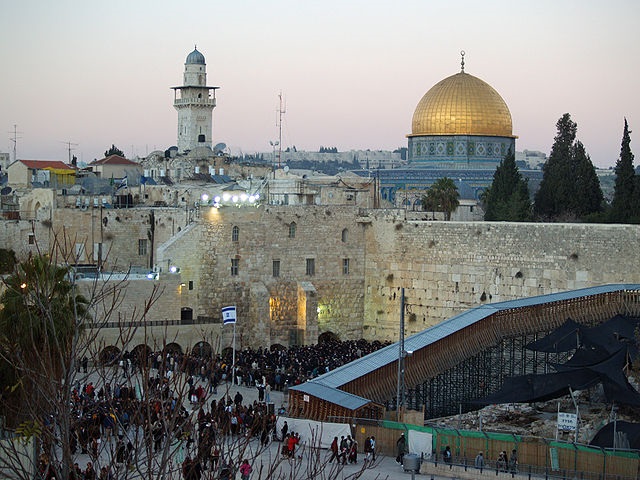Trump And The Middle East: Are There Any Signs Of Hope?

Despite some gymnastically optimistic analysis in certain quarters, the future of the Middle East surely looks bleak with Donald Trump in the White House.
The most immediate crisis revolves around Syria.
There, Amnesty International judges that "right now a Trump presidency looks like making a catastrophic situation for Syrian civilians even worse".
While acknowledging that it's "too early to say exactly what Donald Trump's presidential victory means for Syria's beleaguered civilians", the charity goes on to speculate that Trump may well "pivot" the US towards a Putin-Assad alliance against ISIS. After all, Trump has said that his priority is wiping out ISIS, not deposing Assad.
Amnesty says that "aligning with the Syrian and Russian governments would almost certainly spell even greater disaster for Syria's long-suffering people" and lead to "many more" civilian casualties.
"And this kind of realignment may carry with it some kind of acceptance of the Damascus/Moscow line that all opposition in Syria – whether armed or unarmed – amounts to 'terrorism'," Amnesty warns.
Trump has also talked of building "safe havens" in Syria which he himself has linked to containing Syrians in their war-torn country. "I would stop the Syrian migration and the Syrians from coming into this country in two seconds," he told NBC's Meet the Press in July.
Amnesty says that a "consequence of a Trump 'safe zone' could be the beginning of a process of partitioning the country. This is an idea that itself may gain US political support under a Trump presidency, appearing to offer relatively quick and easy solutions."
On Iraq meanwhile, Trump has made contested claims that (unlike Hillary Clinton) he opposed the 2003 invasion which led to the toppling of Saddam Hussein.
Regardless of that policy, he is unlikely to want the US to be more involved than it has to be in assisting the Iraqi forces in their attempt to drive ISIS from the beleaguered country.
US military presence in Iraq has reportedly been creeping up since 2014, when President Obama told Congress he was ordering "up to approximately 275 US Armed Forces personnel" to Iraq to fight ISIS. Trump may wish to reverse that trend.
Nonetheless, he has said that, "We're going to have to do something extremely tough over there."
The truth is that though he will doubtless be being briefed heavily on them in the coming weeks, Trump's policies when he takes office in January towards Iraq, and to a lesser extent Syria, are hard to predict. As Time magazine has said, a Trump victory casts "a cloud of unpredictability over an already unstable region".
Less hard to forecast - on the surface at least - is Trump's approach to another seemingly intractable conflict central to the region: that of Israel-Palestine. This is because in September, Trump delighted Israel's right-wing prime minister Benjamin Netanyahu by telling him during a lengthy meeting that the US would "recognise Jerusalem as the undivided capital of the State of Israel".
The US, the UN and almost every country in the world currently refuse to accept that Jerusalem is Israel's capital, with most major embassies functioning in Tel Aviv. International consensus is that East Jerusalem — having been seized militarily in the Six Day War and then unilaterally "annexed" — is occupied territory, just like the West Bank.
If Hillary Clinton was pro-Israel, Trump had gone one better. Trump reportedly invited Netanyahu to the US when the latter called the former to congratulate him on his victory this week, and there are no signs that Trump intends to stand up to an Israeli prime minister who himself does not appear to want a deal (indeed, "Bibi" this week turned down a French initiative at renewed talks this week, perhaps emboldened by Trump's win). Further, with both Houses in the US Republican-dominated, the pro-Israeli position in Washington seems entrenched.
On the other hand, according to the "Nixon went to China" maxim, you just never know. Back in May, Trump talked at length about wanting a deal – "man, would that be a beauty" – between Israel and the Palestinians. The transition of power in the White House is as good a time as any to make a fresh start.
And anyway, Barack Obama is said to want to make a final push for talks in his final two months of office. The outgoing president is still considering whether to instigate a new UN Security Council resolution. This would at a minimum create a series of parameters which – if Trump were to do all that the Israeli right wants him to do – he would have to deviate from.
Next year, Trump comes to power exactly 50 years after the Six Day War. What better time to initiate a fresh drive for a deal which could, just possibly, hold the key to a wider peace across the region? But on paper at least, the signs of peace in the Middle East remain as elusive as ever.











